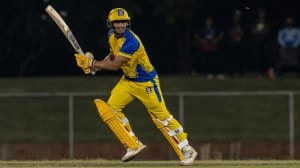Paul Lynch wins the 2023 Booker: Ireland’s long tryst with the prize
Since the inception of the Booker Prize in 1969, the Irish have indeed been the light in its literary sky. Here's how Paul Lynch, this year's winner, adds to the tradition.
 Paul Lynch poses for a picture with a bound edition of his winning book Prophet Song during The Booker Prize 2023 award ceremony at Old Billingsgate Hall, London, Britain, November 26. (Photo: Reuters)
Paul Lynch poses for a picture with a bound edition of his winning book Prophet Song during The Booker Prize 2023 award ceremony at Old Billingsgate Hall, London, Britain, November 26. (Photo: Reuters) In September, a couple of months before he emerged as the winner of this year’s Booker Prize, Paul Lynch, 46, tweeted a photograph featuring five of the six shortlisted authors: Sarah Bernstein (Study for Obedience), fellow Irish writer Paul Murray (The Bee Sting), Chetna Maroo (Western Lane), himself (for his fifth novel, Prophet Song), and Paul Harding (This Other Eden).
In the tweet, Lynch wrote, “This is a wondrous moment for me and I’m so pleased to be sharing it with these superb writers including my friend Paul Murray. Seamus Heaney wrote in the North: ‘Expect aurora borealis in the long foray…’ Last night, there was light in the sky.”
Light in the sky: Irish writers and the Booker Prize
Since the inception of the Booker Prize in 1969 (then known as the Booker Prize for Fiction), the Irish have indeed been the light in its literary sky. Lynch is the fifth writer to have won the Prize, for his novel that explores a dystopian Ireland where democratic rights are under threat from a totalitarian regime.
Before him, the Prize went to British-Irish novelist Iris Murdoch in 1978 for her The Sea, The Sea, Roddy Doyle in 1993 for Paddy Clarke Ha Ha Ha, John Banville in 2005 for The Sea, and Anne Enright in 2007 for The Gathering. In 2018, British writer of Northern Ireland-origin, Anna Burns, won it for Milkman.
Ireland’s prodigious literary talent is perhaps better represented by the fact that Irish writers have been a staple in the Prize’s long- and short lists. In the 54 years since the Prize’s inception, 37 Irish authors have made it to the longlist. In the last 15 years, at least one or more have featured in the longlists.
This year, four of the 13 writers on the longlist were Irish, making it the maximum number of nominations in a single year. These included Lynch, Murray, Elaine Feeney for How to Build a Boat and Sebastian Barry for Old God’s Time.
This was Barry’s fifth nomination and Murray’s second. The latter had earlier been longlisted in 2010 for Skippy Dies.
Literary capital: From WB Yeats to Sally Rooney
The £50,000 Booker Prize is not the only award where the Irish have made their mark. Four Irish writers — William Butler Yeats in 1923, George Bernard Shaw in 1925, Samuel Beckett in 1969, and Heaney in 1995 — have won the Nobel Prize for Literature for their life’s work.
The poet Yeats, in fact, was also one of the early admirers of Rabindranath Tagore’s work in the West, alongside the American poet and critic Ezra Pound. Yeats and Tagore had met at a dinner party in London in the early 1900s and forged a friendship that led to collaborations, including translation projects. Tagore won the Nobel Prize for Literature for Gitanjali a decade before Yeats, in 1913. British writer Thomas Hardy — who, recently-declassified Nobel Prize for Literature nominations reveal, was in the running for the award in the same year as Tagore — had dismissed Tagore’s scholarship as “practically a production of Yeats”.
But back to the Irish, their literary accomplishments were shaped through the 19th and early 20th century by adversity. If the 19th century bore the blight of the Great Famine, the 20th was marked by strict state censorship and the even more stringent morality of the Catholic Church.
It gave birth to writing as divergent as the gothic horror of Bram Stoker’s Frankenstein, the flamboyance of Oscar Wilde’s short stories, plays and novel (The Picture of Dorian Gray), and, later, the modernism of James Joyce’s Ulysses, Yeats’ spiritual poems, Samuel Beckett’s absurdist drama or Edna O’Brien’s radical memoirs. It also set the tone for the younger, emancipated generation of Colm Tóibín, Banville, and more recently, Emma Donoghue, Tana French, Eimer McBride, Sally Rooney and Claire Keegan.
Lynch: Film critic, writer, realist
Dublin-based Lynch, this year’s winner, began his career as a journalist with The Sunday Tribune, where he was also the paper’s film critic. But it was his eye for the mise-en-scène — the individual tragedies in bigger political narratives of immigration and exile, racism and violence — that led him to his debut novel, Red Sky in Morning (2013). The manuscript saw a six-publisher auction in London — Lynch’s writing career had got off to a flying start.
Lynch had begun work on Prophet Song in 2018. In an interview after the declaration of the longlist, the writer had spoken of the book being his attempt at “radical empathy”. After the win, speaking to The Guardian, Lynch said that in writing of the dystopia, he never wanted to serve up happy endings or neat answers: “Too often writers of political fiction believe they have the answers, they know what it is that needs to be fixed.” Instead, he only wanted for readers to not avert their gaze.
- 01
- 02
- 03
- 04
- 05






































